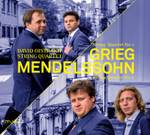|
Back
03/21/2019
Edvard Grieg: String Quartet n° 1 in G minor, opus 27
Felix Mendelssohn: String Quartet n° 2 in A minor, opus 13
Niccolò Paganini: Caprice for Solo Violin in D major, opus 1, n° 20 (trans. F. Belugin)
David Oistrakh String Quartet: Andrey Baranov (first violin), Rodion Petrov (second violin), Fedor Belugin (viola), Alexey Zhilin (cello)
Recording: Studio 4, Flagey, Brussels, Belgium (July 2015) – 64’37
Muso mu-02 (Distributed by Naxos of America) – Booklet in French, English, German and Russian

   
The place of the string quartet in 19th-century Romanticism—of which the present CD features two highly different examples—is a somewhat peculiar one. The Romantics—at least those with much interest in chamber music—certainly did not neglect the genre, yet none of these composers had become as closely associated with the string quartet as a form as Haydn, Mozart or Beethoven, unless one counts Schubert as a full-fledged Romantic. The string quartet as developed by the Viennese classicists enshrines a characteristic symbiosis of expression and formal structure, so that in many cases (even, I would suggest, some of Beethoven’s late quartets), it is hard to wholly distinguish these two features, or to say which is superimposed upon the other. The touch of austerity intrinsic to the string quartet “sound” thus means that the dramatic and emotional content of the work must derive from its basic material and overall structure; the Romantics are often more likely to impose expression on a work through harmonic color or contrast in texture, for which the string quartet provides fewer opportunities than even, say, a piano trio. And so it is that the structural weaknesses of a Dvorák or even a Schumann can come across more starkly in their quartets than elsewhere.
Another risk of the starkness of the idiom here is that the expression of untrammelled passion becomes too raw and unrelieved, and something like this seems to me to be the case in Grieg’s G minor Quartet, his only completed string quartet to have survived. In terms of melodic material, this is cut from the very same cloth as the Piano Concerto in A minor (a work I admit I have never cared much for): overwhelmingly passionate, often lacking subtlety, and not quite well formed in the classical sense. In performance, the trick here is to make the listener feel drawn in emotionally rather than simply hit over the head, and on this count the young David Oistrakh String Quartet is wholly successful. It is daring for a quartet to name itself after such a great virtuoso, but these players live up to their billing. One is immediately struck by the beautifully gleaming tone of first violinist Andrey Baranov, but the whole group displays exquisite blend and impeccable balance, yet joined to tremendous passion and urgency, in the best Russian tradition. (The close-up recording adds to the sense of vividness and immediacy, although it also captures the nicely resonant acoustic well.) This is a reading of great sweep and fire yet never at the expense of good ensemble; Grieg’s exuberance largely emerges as both coherent and compelling.
Unlike Grieg, Mendelssohn wrote six string quartets, or seven if you count the unpublished yet very assured juvenile work in E flat. Being an early Romantic and a rather classically inclined one at that, Mendelssohn never struggled too much with formal rigor, and if his output for string quartet has never been ranked as one of the greatest glories of the repertoire, it is because it seldom shows quite the degree of inspiration of the composer’s very best work. Nonetheless, his consistently well-crafted and often very enjoyable quartet cycle well deserves the increased attention it has received in recent years. The A minor Quartet is an early work, composed just a few years after the Octet, and if its themes can come across as a bit underdeveloped and lacking the rich personality of the latter, it is nonetheless an effective piece in which Mendelssohn gets to show off his fine lyrical sensibility and contrapuntal skill. Here the sheer intensity of the Oistrakh Quartet’s decidedly late-Romantic approach brings some mixed results. I have never heard this music sound so turbulent; the players bring out a tremendous expressive range, with aggressive attacks in climaxes and a breathless, almost hushed quality in lyrical passages. The beginning of the second movement, in particular, could use a lighter touch, more lyric charm, yet the same movement concludes with great poignance; furthermore, the sheer electricity of the finale is hard to resist. This is not the only way to play Mendelssohn, and in some respects a lighter and more direct approach (for which recordings by the Melos Quartet and the Pacifica Quartet are worth considering) is distinctly preferable, but the Oistrakh Quartet realizes its chosen approach with manifest commitment. Like the rest of the disc—which concludes, by way of an encore, with an arrangement for quartet by the ensemble’s violist of a Paganini Caprice, which is great fun in an off-the-wall sort of way—it is well worth a listen.
Samuel Wigutow
|